A very little known or remembered fact about the great Elder, whose Feast Day is today, is the following.
When Elder Barsanuphius was appointed the highly prestigious position of Skete Superior [ meaning head of the Optina Skete of St John the Baptist ],
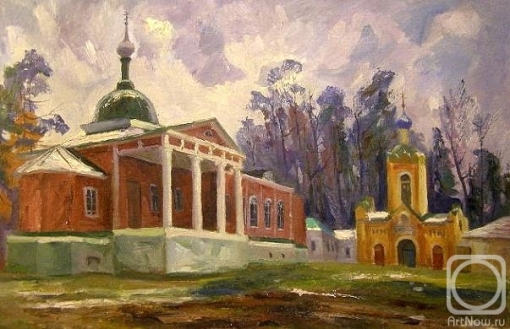
the Elder,
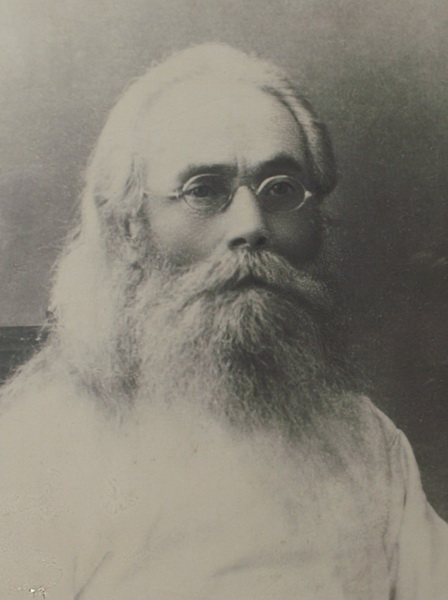
from his own money, spent 30,000 Tsarist rubles -- what I estimate to be about $ 420,000 today -- to renovate it. The Skete had fallen on bad times due to the illness of Elder Barsanuphius' predecessor, Elder Joseph [Litovkin]. Thus major projects were needed to get it in shape again.
Without advertising himself the way a modern businessman/self-marketer would do -- "Look how charitable I am ! I donated to the Red Cross" -- or a contemporary company trumpeting its trendy 'caring' thus :"We are giving x percent of our profits to charity, aren't we impressive ? " -- Elder Barsanuphius plowed this astounding sum, nearly half a million dollars, into fixing up the dilapidated Skete.
Far from being grateful, a number of monks at the main Monastery [ less rigorous asceticism than the Skete ] grumbled. They had no reason to complain, but malcontents always find excuses like rabbits out of hats. Somehow the core group of disaffected monks expanded to eventually form networks reaching to the salons of St Petersburg frequented by high Orthodox Church authorities. Ridiculous rumors abounded. When one lady was sent to check them out, she only added fuel to the fire by inventing more nonsense. If Elder Barsanuphius was given flowers by his grateful followers, this was distorted into "He is living in LUXURY so great that he has flowers strewn all over his cell". If an elderly woman was on hand to facilitate that interview, "He is allowing women too close access." No mention of her age or the reason for her presence : to be beyond any doubt highly respectable. And the like.
Instead of recalling the magnificent gift bestowed on the Skete and by extension on the Monastery by the future Saint, Optina officials were unable to stand up for their famed Elder probably out of fear and indecision. Once the snowball started rolling, it gathered momentum until in January 1912, then-Bishop Seraphim {Chichagov} was sent to investigate.
While remembered for his compilation of the Diveyevo Chronicle while yet a priest, Bishop Seraphim made no attempt to conduct an unbiased investigation. Barely speaking with the Elder to get his side of the story of the silly accusations, the future Metropolitan of Warsaw and All Poland made a sweeping, condescending conclusion. He sniffed, "Fr Barsanuphius [needs] to be given a more extensive sphere of activity, whereas in the Skete he [is] turning totally sour."
Myself, I would never trust this Met. Seraphim [Chichagov], who could roll such facile statements off the tongue with seemingly no worry about their accuracy. How did the emissary of the St Petersburg Synod determine the Elder was 'going sour' ? The whole notion is demented. The Elder was not a type of yoghurt that had been kept too long.
And worse, the Elder was obviously suffering from some old-age or pre-old age infirmities. To recommend that St Barsanuphius be given a heavier burden of work than he already was shouldering was equivalent to deliberately sentencing him to a premature repose. It was well known that during the Russo-Japanese War some years earlier, Fr Barsanuphius had been forced to go to the front in the Russian Far East as a chaplain over his vigorous protestations that he was physically in far too poor condition to travel such a vast distance confined to train compartments filled with other passengers.
When the St Petersburg Synod quickly confirmed Bishop Seraphim's assessment, the Elder was sent off to the inexcusably far away Old Golutvin Monastery essentially to die. And die he did, exactly one year later, observed his loyal attendant, Fr Nicholas [Belyaev - the future Elder Nikon of Optina ]. The date was April 14, 1913.
St Barsanuphius of Optina
St Barsanuphius of Optina
Re: St Barsanuphius of Optina
As it was Elder Nektary of Optina's Feast Day 2 days ago, 2 references of his to Elder Barsanuphius seem in order.
- Elder Barsanuphius confided the story of his conversion to Elder Nektary. The latter did not reveal this, unfortunately. Or if so, the transfixing tale was not recorded. It must have been quite personal to Elder Barsanuphius.
Elder Nektary did relate this astonishing anecdote, however : "See how great Elder Barsanuphius was ! And he was remarkably humble and obedient. Once, when he was a novice, he was walking past my porch and I said to him as a little joke: "You have exactly twenty years to live." I said it to him as a joke, but he was obedient and exactly twenty years later, on that very day - April 1 - he reposed. That's how great his obedience was."
- Elder Nektary waxed eloquent and humble in the following description : "Elder Barsanuphius was so great that I stand no higher than the end of his little toenail. From a brilliant soldier, by God's blessing, he became a great Elder overnight."
That last remark helps us realize what a marvel it was that Elder Barsanuphius came to Optina at all, let alone became the Elder of the Skete with disciples amongst clergy, monastics and laity from all over.
Re: St Barsanuphius of Optina
Look how MP articles overdo [ exaggerate ]. Re Elder Barsanuphius, the same quotation appears in a recent essay :
"He got pneumonia, was on his deathbed when, at his request, the orderly began to read the Gospel to him, and the patient saw Heaven open and heard a voice from above commanding him to go to Optina Pustyn. His spiritual vision was opened. In the words of Elder Nektary: “From a brilliant soldier, in one night, by the good will of God, he became an elder." -- http://orthochristian.com/121712.html
I have combed over the standard Life of the Elder and I don't remember such a grandiose statement. "The patient [The Elder ] saw Heaven open " - ??
and [ he ] DRAMATICALLY "heard a voice commanding him to go to Optina " - ???
That isn't how Elder Barsanuphius got to Optina at all [ unless some new documents have surfaced ]. Instead, the Elder related the true version. He was given a certain magazine in which there was an article about Elder Amvrosy. Colonel Paul Ivanovich Plikhankov was quite drawn to this marvelous figure. This Kazan-based Tsarist military figure immediately determined to set vacation time aside for a trip there. While his superior officers thought he was heading for a sightseeing trip such as to the Italian Riviera,

instead, the future Elder was preparing spiritually for the trip to Russia's citadel of asceticism, a journey which he probably sensed would change his entire life.

Then, notice how the same quotation by Elder Nektary of Optina is distorted in the MP version. The words 'GREAT Elder' are scaled down to a mere "elder" with no capital E in the English translation. Certainly Elder Nektary would have selected such an adjective, since we know he spoke of himself as having minimal spiritual attainment. His own, St Nektary modestly asserted, measured no higher than not just the toenail of Elder Barsanuphius, but the END of that toenail. I would propose that the MP still carries vestiges of the Communist worship of the common man over truly spiritual, clairvoyant Elders.
Re: St Barsanuphius of Optina
Well, it's that day again ! The same one on which Elder Nektary per the 1st post prophesied to Elder Barsanuphius that he would repose in two decades. And that was indeed the day that the obedient Elder Barsanuphius breathed his last - exactly twenty years later !

The Life of an Army Chaplain: St. Barsonuphius of Optina 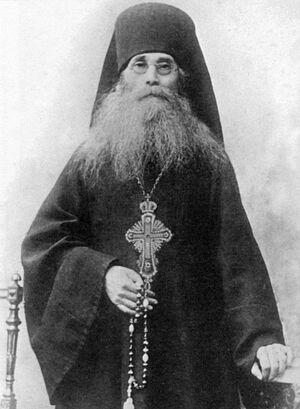
One of the great Optina elders, St. Barsonuphius, in the world named Pavel Ivanovich Plikhankov, was an army colonel before he joined Optina Monastery. He descended from the Orenburg Cossacks, and so the military life was in his blood. Everyone around him knew him to be a just, and pious officer, who regularly attended church services and was well read in spiritual literature. But not even he knew as a young officer that he would be a priest of the Church. Although, to be more exact, St. John of Kronstadt knew.“When I was still an officer I had to go to Moscow on business. At the train station I learned that Fr. John was serving Liturgy in a church in one of the military buildings. I went there straightway. When I entered the church the Liturgy had already ended. I went into the altar. At that moment Fr. John was transferring the Holy Gifts from the altar table to the table of oblation. After setting the chalice down, he suddenly came up to me, kissed my hand, and without saying anything walked away again to the altar table. All who were present exchanged glances and later said that this signified some kind of event in my life, and decided that I would be a priest. I laughed at them, since I had no thought at all of becoming a priest. And now you see how inscrutable the ways of God are—I’m not only a priest, but even a monk.” As we know, he not only became a priest and a monk, but a clairvoyant elder.
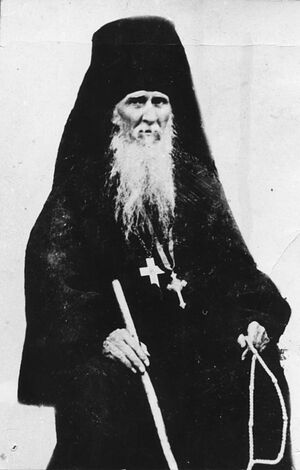
Elder Ambrose of Optina
Colonel Plikhankov visited Elder Ambrose in Optina to ask his advice about joining a monastery. Elder Ambrose told him that he must serve in the military another two years until he can officially retire on a pension. In the meantime, he was to use his large salary to make donations to churches and monasteries, a specific list of which the elder provided. At the end of those two years he was to return to Elder Ambrose—that is to the Optina Skete of St. John the Forerunner, where he would begin his monastic life. When the time had come to leave the world, Colonel Plekhanov suddenly encountered various obstacles—his pay was held up and he was unable to settle all his financial accounts. Elder Barnabas of the Gethsamene Skete of the Holy Trinity-St. Serguis Lavra helped him find benefactors to pay off these bills, and he was finally freed to become a monk in the Optina Skete.Fr. Barsanuphius was under Elder Ambrose’s spiritual guidance until the elder’s repose. The elder’s successor, Elder Anatoly (Zertsalov), gave him the obedience of cell attendant to Elder Nektary, Elder Ambrose’s close disciple and one of the last Optina Elders. During the next ten years Fr. Barsanuphius, under Elder Nektary’s guidance, became experienced in monastic life, received the tonsure, and ordination into the priesthood.When the Russo-Japanese war began, Fr. Barsanuphius was sent to the Far-Eastern front as a chaplain for a field hospital dedicated to St. Seraphim of Sarov. Hieromonk Barsanuphius wrote letters from the Front describing his life as an army chaplain.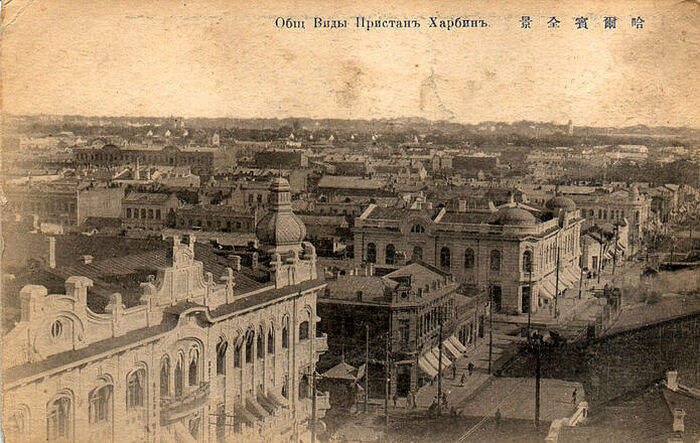
Harbin
“Preserved by divine grace and protected by your holy prayers and archpastoral blessing,” he wrote to Bishop Benjamin of Kaluga, “all of us, five hieromonks, safely arrived on May 2, in the city of Harbin, and we await directions for our further assignments from the main quarters in Liaoyan…”
“The sight of Russian churches at the stations of the Siberian railroad comforted us. There was wilderness all around. But then there would be a church, and around would be grouped a few, two or three dozen small houses. Holy Russia in miniature. One’s soul feels radiant and joyful…”1
The Elder later recalled his travels as a chaplain to the Far East. In a... letter from the Far East, after arriving in the town of Mullin, he wrote, “It was just as if I had landed in paradise. There was nature, for all it was worth… Between myself and those around me there was formed a simple, amiable relationship. The head doctor turned out to be a Ukrainian and all the others were real Russian people and believers, among whom of course, were the nurses [who would continue to write to the elder even after the war]. I felt fine there.”
The hospital where he was based was a department of the Red Cross brotherhood founded in the name of Bishop Pitirim of Tambov, who would later be glorified as a saint. “I happened to find and image of the holy hierarch four years ago in our monastery bookstore. I acquired it and set it in a frame, and with the blessing of Fr. Joseph placed it in the skete trapeza, where it is probably located even now. And now I, the unworthy one, have been vouchsafed to serve in a brotherhood named after this holy hierarch, its protector. Now the hospital is filled with sick and wounded brought in from the field of battle, from somewhere near Liaoyan. Some are discharged and head back to the army, while in place of those that are killed new ones arrive. There are up to 250 men in the hospital now, and another hundred are expected. The available medical personnel are not numerous: five doctors, fifteen nurses and twenty orderlies. There is enough work for everyone, and the nurses get it in particular—ceaseless work goes on both night and day. Their care [for the wounded] is good. I have to confess the wounded and commune them with the Holy Mysteries, and comfort them spiritually, as the Lord gives me understanding.
“Only now that I have encountered the wounded Russian officers and soldiers face to face have I been convinced of what an abyss of Christian love and selflessness is contained in the heart of a Russian; and nowhere, perhaps, do they manifest it with such astonishing power and greatness as on the field of battle. Only during the hard times of war is it clearly known that the faith of Christ is the breath and life of the Russian people, and that with the loss and dissipation of this faith in the heart of a nation, its life in inevitably cut short. For each nation there is posed some task or another, which constitutes its existence the content of its life. But the Russian nation has one task, which is rooted in the depths of its soul. This is the eternal salvation of its soul, the inheriting of eternal life, the Kingdom of Heaven…“
I spend the greater part of my time in the Red Cross hospital, and am occasionally tired—not from work, but from the heat…“I am quite alone here; there is no one with whom to take counsel or converse to the benefit of my wretched soul, though there are many good people around me. The usual course of my life is as follows: I arise at two in the morning and read Morning Prayers, the Midnight Service and First Hour. Then I lie down and arise at six in the morning and read Third and Sixth Hours and Typica. I have tea with bread. Then domestic work and work in the hospital, and lunch at the Red Cross… I rest for an hour, and then again to the hospital. At ten in the evening I read Evening Prayers and Ninth Hour and lie down to sleep. I replace the Hours with the Jesus prayer.
I have almost given up the Five-Hundred,2 although I do not lose hope that with God’s help I will again begin and do it all, as I ought. In general, I have not lost touch with much of the Optina order… Many of my colleagues soar and glide high in the heavens like swallows, falcons, and even eagles, but I cannot even lift myself us from the earth, and am weighed down by the sleep of despondency. But I do not lose faith that, perhaps, the Lord will return me to the Skete, and I will shut myself in my silent cell and meditate only on the salvation of my own sinful, wretched soul. But when this time will come is known to God alone…”
Russia did not win that war, which ended in 1904, but as historian S.S. Oldenburg wrote, “Not all had been lost. Japan had felt the might of Russia at the very moment when it was ready to reap the fruits of its successes. Russia remained a great Asian power, which would not have been the case if she, to avoid war, had faintheartedly retreated before Japanese importunities in 1903. The sacrifices made were not in vain. For long years to come, Japan, debilitated by the fighting to a far greater degree than Russia, was unable to resume its forward motion in Asia…”4
Elder Barsonuphius’s return from the Far East was fraught with danger and he could have died several times had the Lord not saved him. Wanting to lean against a door on the train, an invisible power prevented him—the door was unlocked and he would have fallen out of the train at high speed.
Another time he felt a premonition to not board a train, and that train was wrecked, with many causalities.
Another time he was saved from a murder attempt. “The Lord miraculously saved him from all these dangers, and perhaps from many others which he did not notice,” wrote Fr. Nikon of Optina.
But finally, with the Jesus prayer constantly on his lips, Elder Barsanuphius arrived at his beloved Optina Skete—the mere remembrance of which strengthened him in all difficulties and despondency far from home, in the midst of the wounds and woes of war.
From the book, Elder Barsanuphius of Optina Article by OrthoChristian.com 4/14/2022
1 Victor Afanasiev, Elder Barsanuphius of Optina, compiled and translated into English by St. Herman Press (Platina: St. Herman Press, 2000), 29–30.
2 The “Optina Five-Hundred” prayer rule: 300 Jesus prayers, 100 “Most Holy Mother of God save us”, 50 to the Guardian angel, and fifty to All saints.
4 S. S. Oldenburg, Tsarstvovanie Imperatora Nikolaya II (The Reign of Emperor Nicholas II) (St. Petersburg, 1991), 300.